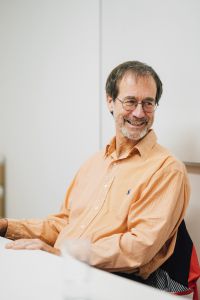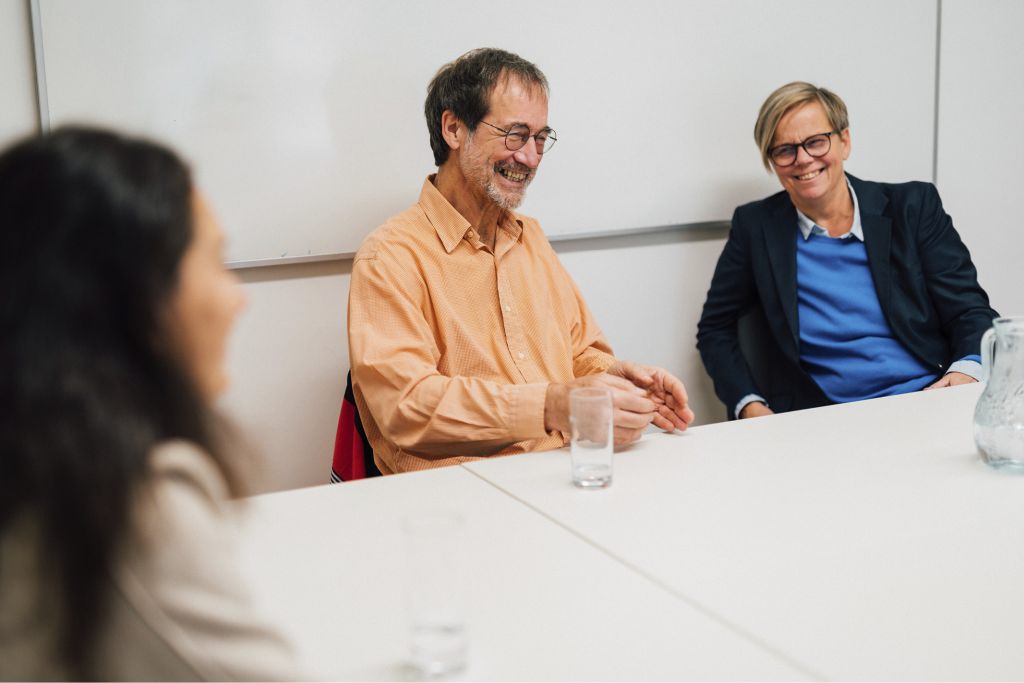A conversation about the healthy practice of one’s art, the situation in everyday professional life, and ways of creating awareness with Vice Rector for Organisational Development, Gender, & Diversity Gerda Müller, Department of Music and Movement Education/Rhythmics and Music Physiology head Bernhard Riebl, and the newly arrived voice professor Eva Maria Riedl-Buschan, Department of Vocal Studies and Music Theatre.
In your project “Art and Health”, the mdw is placing the physical and psychological well-being of all University community members front and centre. Just what all does this involve?

Bernhard Riebl (BR): The underlying concern of Art and Health is to create an awareness of how, in one’s training and everyday professional life, it’s not just about delivering a certain level of performance: the issue is also that of how we can reconcile the required performance with health and well-being. The mdw seeks to create a forum for dealing with this issue. And in this spirit, Art and Health’s offerings address everyone who’s attached to the University: faculty, students (where we’re chiefly concerned with the practice of their respective art forms), and administrative personnel.
Gerda Müller (GM): It’s important to the mdw that the health of those who work and study here be preserved. To this end, we’d like to create the appropriate conditions. One question we’re dealing with is: What is healthy artistic practice, and what does it require? And then we also have the needs of our administrative staff. With the project group Art and Health, we’ve put these areas of concern on a solid institutional footing and launched various projects, emphases, and initiatives to support their development.
The mdw is in great shape in terms of the individual attention that its students receive, and that’s of inestimable value.
Bernhard Riebl
Could you give us a couple of examples?
GM: There’s the annual Gesundheitstag [Health Day], which is for everyone attached to the mdw; then we have our Center for Further Education, which coordinates with Art and Health with regard to the mdw’s further education programme. And our efforts also reach deep into curriculum development, which enables us to offer regular courses, as well. We’d like to create the right conditions and provide people with the right tools to help them pay good attention to their own bodies.

How strong is the awareness of this topic among students and faculty? Are they making use of your offerings?
BR: Among students, acceptance is very high. But one fundamental issue is that many of our students have been accustomed to paying attention exclusively to short-term successes ever since they were little, and they’ve been told time and time again that they just have to practice more—or that pain is something normal. On this count, compulsory coursework can accomplish a lot in terms of awareness-raising. And in a great number of other courses offered by our department’s Music Physiology division, students can put alternative approaches into practice.

Eva Maria Riedl-Buschan (ERB): I’m excited about the offerings that the mdw has created, here. I’m an mdw alumna myself, and even back in my student days, I was interested in how the body works and what that entails for how we practice our professions. In truth, our profession is elite sport—and you’d ideally have a team to support such an undertaking, someone to look after you physically and mentally. For athletes, it’s totally normal to have mental trainers and physicians on hand to provide regular check-ups. I’d like to see that become the case in the arts, as well.
The COVID pandemic showed me how passionate students and teachers are about the training that’s offered at the mdw.
Gerda Müller
Would you say that making students aware of this topic is part of your job as a teacher?
ERB: Yes, absolutely. When someone’s 17, 18, it’s a topic that they’re just not all that focussed on—and as a teacher, you can help change that. So above all, I want to let people know how important it is to take these educational opportunities. Because experience has shown me that in professional life, no one cares about your problems. You’re responsible for preserving your own health, and as artists, we all get confronted with this topic sooner or later. In our area of work, we have to deliver high performance to exacting standards, and what we do to accomplish that has a huge effect on our bodies and minds—even just due to the stress hormones involved. A doctor I’m friends with once told me that after every performance, we’d really have to do half an hour of vigorous exercise in order to get our cortisol levels back to normal.
BR: What’s interesting is that while it used to be the case that education students were far more interested in this than performance students were, the past few years have seen the performance students catch up. I think this is because word’s gotten around by now that your performance improves when you treat your body with more respect—and it also enables you to pursue your studies more efficiently. Among teachers, things are a bit different: some of them have been interested in this topic for years and possess an unbelievable amount of know-how, while there are other teachers who show hardly any interest at all. But here, too, it can be said that things have taken a turn for the better.
Why has this change come about?
BR: I do think that our project Art and Health has contributed a lot, here—as has the Health Day event that we mentioned before, which everyone’s familiar with by now. The latter includes high-quality introductory offerings from the fields of music physiology and music psychology for both faculty and students. A special contribution is also made by the courses for students where teachers see quite often how their students’ development is supported by music physiology-based approaches. And teachers whose interest has been piqued will find that they have far more options for further training available to them than used to be the case.
GM: The analogy to elite sport is one that I find quite fitting, and the question would then be: What support do I need in order to deliver this high level of performance for the longest possible time? From what I can see, the past few years really have witnessed an increase in awareness. It’s become clear that psychological and physical health are essential to our ability to deal well with the enormously stressful situations that we experience onstage.
With my students, I pay special attention to posture and breathing techniques. It’s always fascinating to see how someone’s sound develops when they use their body just a little bit differently.
Eva Maria Riedl-Buschan
How is the mdw addressing this topic?
GM: We offer a very diverse programme. It’s first and foremost about taking a holistic view of the body and about the things people need in order to work well and be able to practice their art. Psychological health is an extremely important part of this. So one thing that we’ve initiated is a lecture series about dealing with stress, performance-related anxiety, and states of panic. We’ve also established a Psycho-Social Support Centre in order to create a low-threshold option for students to talk about these things. I think that, by now, the impression has solidified that in order to perform well as an artist, you need to do more than just practice. And I think we’ve succeeded in making this topic more visible within our system and raising more awareness of it.
BR: I’d like to underline once again here how we’ve set up courses that include things like concentration exercises and performance coaching in order to deal with this thematic area in a very concentrated way—and to address the fact that consistently high performance isn’t something that goes without saying. Our performance coaching offerings have become very popular over the past ten years, and they’ve also now gained a presence in numerous courses.
GM: Another crucial thing is that this university’s leadership has recognised how important it is to facilitate such teaching and make resources available for it.

Ms. Riedl-Buschan, is this topic paid enough attention in everyday professional practice and professional life?
ERB: Once you’ve graduated and landed a job, it’s made clear to you very soon that you have to deliver. Nobody’s interested in how you’re feeling or whether you stressed out. I started engaging with this topic very early on, because I figured that top-notch performance happens not by chance but through the interaction of numerous bodily parameters. Back in my early 20s, I completed the mdw’s special programme Breathing, Voice and Movement Education, consumed more and more reading material on the topic, and obtained invaluable input from experts in the field. So what I know with certainty and from my own experience as a singer and teacher is that when things take place in harmony with your own body and mind, they feel easy. But I then had to learn that that there’s hardly any space for this in professional life, due both to time constraints and to the fact that many people just don’t take it seriously enough. And while I do know that several theatres and opera houses at least offer in-house psychologists in order to help with psychological stress, offerings like that see very little use.
What I want is for these topics to be taken seriously. We have experts who are here to provide advice and support to the mdw community’s members.
Gerda Müller
That sounds like it’s taboo…
ERB: It certainly was in my day.
GM: Excellence is at the core of what we do as a university. And as soon as someone develops problems, such as physical difficulties, that stands in opposition to excellence. So it’s incredibly important for our institution’s further development that this taboo be broken. We’re seeking to point out how incredibly burdensome it can be to attempt to deliver performance at this level with such complaints. It inhibits you, and it can more or less be your end. That’s why we want people to realise as students that there are things on offer that can provide help and support, and that it’s okay and normal to take advantage of them.
ERB: Studying to become a performing artist has never been easy, when you think about the competition that exists, and this aspect has grown even more extreme over the past 10 years. It’s all gotten harder. Back when I launched my career as a mezzo-soprano at age 24, the people at the various theatres always made me aware of how I was more or less a hatchling—and my older, more experienced colleagues took me under their wing. Today, it seems to me like the focus is more and more on young artists—with the consequence that older and more experienced colleagues are getting dropped more and more often. What this means is that precisely these colleagues’ expertise and experience concerning how to deal well with all the rehearsing and performing has become less available—which is why the work we’re doing here at the mdw is so immensely important.
What’s the mdw’s strategy for creating more awareness around these topics?
BR: In order to get our teaching faculty more and more involved in this respect, the mdw’s putting a special focus on newly arrived teachers: this is why we include music physiology in our introductory module for new teaching staff. But I think that such awareness is also a generational question, so I’m very optimistic that if we keep paying attention to these topics at the mdw, the awareness around them will keep increasing. Above and beyond that, it’s naturally the responsibility of the studies commissions to also provide students with the best possible music physiology-related tools.
GM: As a university, the mdw functions as a model: we aspire to convey humanist values. This is why it’s so important that we offer good preparation for those issues that our students will face in their professional lives, so that our graduates go out into the world equipped with this knowledge of where they can get help when they need it. And one also shouldn’t underestimate the mdw’s interwovenness with cultural institutions: whenever our students go to their engagements and share their knowledge, they can act as multipliers. But in order to do so, they need to be well trained.
BR: That’s where we come in: the Department of Music and Movement Education/Rhythmics and Music Physiology offers a certification programme on this topic where artists who’ve already launched their careers can catch up on certain aspects of training. This is a wide-ranging programme that deals with themes from both music psychology and music physiology. Our participants include artists who graduated many years ago, and they bring a great deal of professional experience to the table. These participants then go on to integrate the knowledge they’ve acquired into their everyday professional lives, and they also benefit the development of our programme by helping us to continually reassess its relevance to actual practice.
In truth, our profession is elite sport. For athletes, it’s totally normal to have mental trainers and physicians on hand to provide regular check-ups. I’d like to see that become the case in the arts, as well.
Eva Maria Riedl-Buschan
Vice Rector Müller, what topics do you think the mdw might be taking on over the next few years?
GM: Our university’s students and employees came through the COVID-19 pandemic very well—with loads of strength, energy, and dedication. But people are still in crisis-mode. In times like these, one extremely important aspect is to ensure that things are stable and remain heedful of how the present situation influences people’s insecurities. This, I think, will be the big challenge of the next few years—that of providing support in this regard and giving young people a perspective. The current conditions certainly aren’t the easiest when it comes to ensuring good artistic training. But on the other hand, COVID also showed us very quickly just how important the arts become during a crisis.
By way of concluding, do you have any tips on things that everyone can do to support their own health?
ERB: Definitely sport, lots of physical activity. And I also think it’s important to have mastered some relaxation techniques—of whatever variety. For a while, now, I’ve been supporting colleagues prior to important performances with things like mental techniques. I like to do yoga, personally—but there are also lots of other things you can do. And as the elite athletes that we are, nutrition is also an issue. We have different, more individualised nutritional requirements that need to be ascertained by a physician.
BR: If I could only say one word here, I’d immediately say sport, no question. But I also think it’s so incredibly important that people learn early in life to listen to their bodies before they encounter actual problems or pain. And that people develop the kind of awareness that allows them to recognise and react to situations where the demands made by their lives are weighing them down. If we work on that, a lot can be achieved.
GM: Alongside all the tips that have been given, which I endorse 100 percent, I also want people to be aware of all the offerings that already exist—not least with an eye to the idea of excellence that I mentioned before. So if there’s a need, then please: reach out and take advantage of the available help and support. What I want is for these topics to be taken seriously. We have experts who are here to provide advice and support to the mdw community’s members.
I think it’s so incredibly important that people learn early in life to listen to their bodies before they encounter actual problems or pain.
Bernhard Riebl
The project “Art and Health”
mdw.ac.at/kunstundgesundheit
Human Resources Development – Center for Further Education
mdw.ac.at/zfw
The Music Physiology Division
mdw.ac.at/mrm/iasbs

